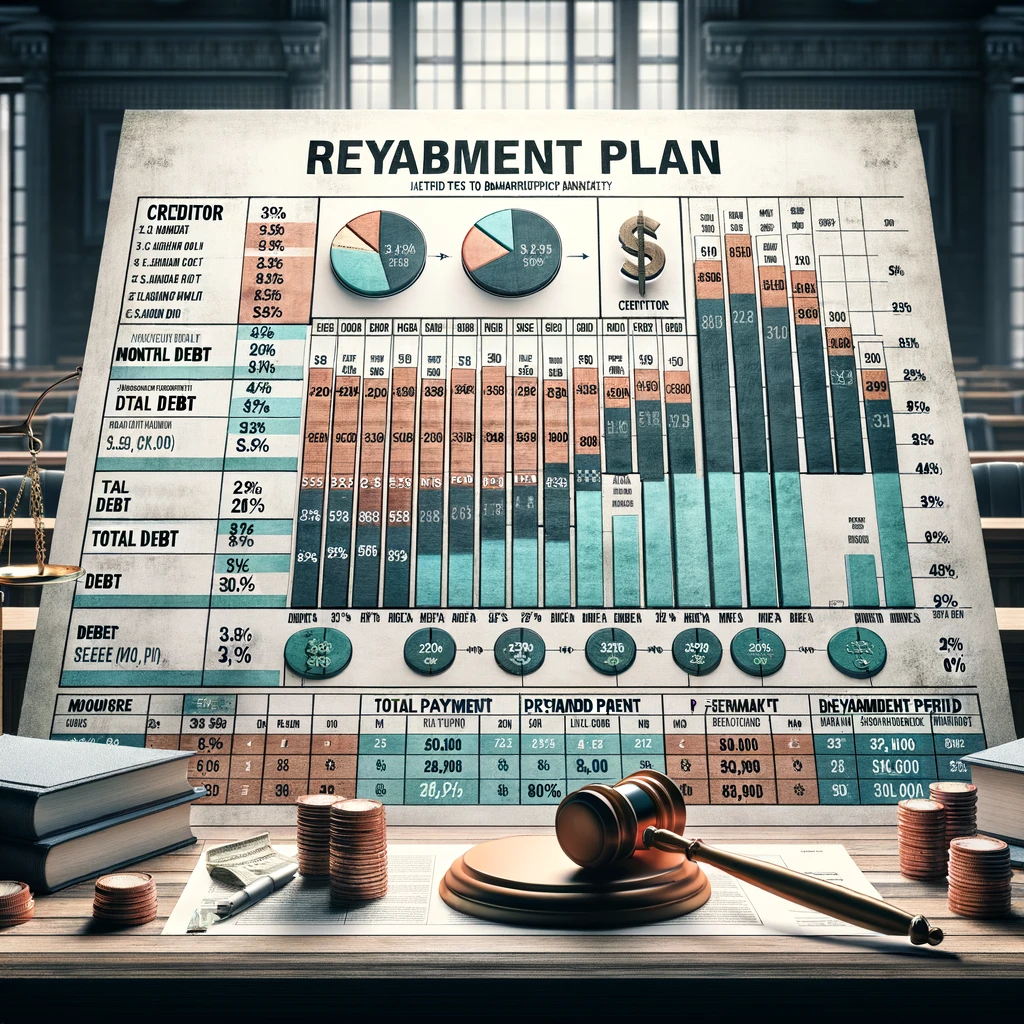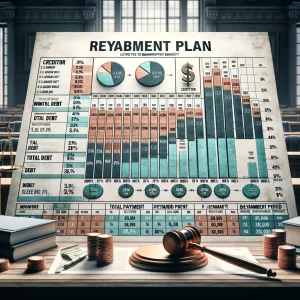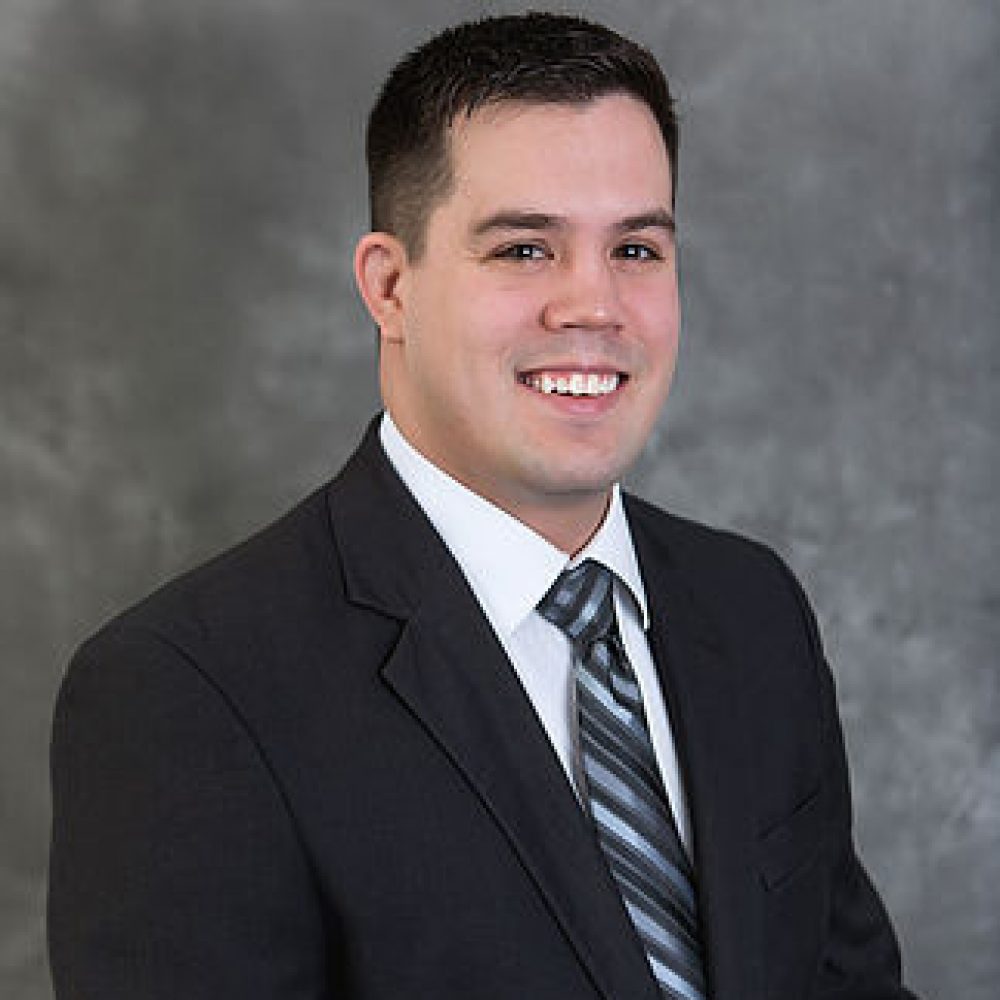Understanding Chapter 13 bankruptcy in Boise, Idaho, can be overwhelming. However, working with a skilled Boise bankruptcy lawyer makes it easier. They guide you through the bankruptcy process. If you have a steady income, Chapter 13 allows a planned repayment plan.
This plan is vital for those looking to rebuild financially. It’s a key part of debt relief services offered by Idaho bankruptcy attorneys. Choosing the right law firm ensures you get the support you need. This support is crucial for confidently navigating through bankruptcy.
Why Can’t I File a Chapter 7?
When considering bankruptcy, choosing between Chapter 7 or Chapter 13 is a big decision. It’s not just about what you prefer. Bankruptcy laws have strict rules about who can use Chapter 7. For example, Boise ID bankruptcy lawyers will look at your income and see how it compares to the average in your state. This helps to figure out if you can go for Chapter 7 bankruptcy. This type is known for clearing away certain debts.
Not every debt is treated the same in bankruptcy. Unsecured debts like medical bills or credit card debt are different from secured debts, like a house loan. Chapter 7 might let you wipe out those unsecured debts. This option is great for people without lots of assets. But, if you make too much money, you might need to pick Chapter 13 instead. This plan rearranges your debts so you can manage them.
A skilled law firm can give a consultation to analyze your situation. They explain both Chapter 7 and Chapter 13 deeply. This is a key part of the attorney-client relationship. Getting this legal help is designed to help you make smart choices for your money’s future.
- The law firm will check your finances to see if Chapter 7 is an option.
- Bankruptcy lawyers will look into what kind of debts you have. They’ll see if erasing them or rearranging them is better.
- They’ll advise on how to keep your assets safe. If that’s not possible with Chapter 7, they’ll suggest other ways.
If you’re struggling with unsecured debts or need a plan for your financial issues, getting advice from Boise ID bankruptcy lawyers is a smart move. It’s the beginning of finding your way back to financial health.
What are the Main Differences Between a Chapter 7 and Chapter 13 Bankruptcy?
It’s important to know the difference between Chapter 7 bankruptcy and Chapter 13 bankruptcy if you’re looking for debt relief services. Each one offers a way to handle big debts, but they’re suited for different situations and come with their own steps and impacts.
In Chapter 7 bankruptcy, you can clear your unsecured debts quickly, often within a few months, by liquidating assets. You might have to hand over some property to the bankruptcy court for this. Whereas, Chapter 13 bankruptcy lets you keep your stuff but makes you pay back debts in a new, more manageable plan.
Boise bankruptcy lawyers often point out that Chapter 13 can stop a house foreclosure. It gives you time to catch up on mortgage payments. It’s also better for changing how you pay secured debts and can protect people who cosigned loans with you.
- Assets and Property: Chapter 7 might mean selling off assets, but Chapter 13 focuses on keeping them.
- Repayment Plan: Chapter 13 has a repayment plan, but Chapter 7 does not, opting instead for liquidation.
- Duration of Processes: Chapter 7 is quick, finishing in months. Chapter 13 takes three to five years.
- Income Considerations: Chapter 13 needs a steady income for repayment plans. Chapter 7 checks if you’re eligible based on your income.
Having a skilled law firm by your side is key when going through the bankruptcy process. They’ll explain each option and help you decide what’s best for your financial situation and goals, considering all the legal details.
Does the Trustee Take My Property During a Chapter 13?
In Idaho, people going through Chapter 13 bankruptcy worry about losing their property. They find peace knowing that with a Boise bankruptcy lawyer, their assets are safe. Bankruptcy attorneys in Idaho make sure their clients know how trustees work. This brings peace of mind.
A Chapter 13 bankruptcy trustee doesn’t take your stuff to sell it. Their job is to manage the payment plan, sending money to creditors. Bankruptcy attorneys in Idaho work hard to keep your things safe during this time.
- Understanding the Role of Trustees in Bankruptcy Services
- Navigating Debt Reorganization with Professional Assistance
- Protecting Your Assets with a Law Firm’s Expert Advocacy
In Boise, bankruptcy attorneys know the ins and outs of bankruptcy laws well. They also care a lot about each client. Idaho bankruptcy attorneys are dedicated to making sure debt reorganization is smooth and fair. They fight for your right to keep your property.
Boise bankruptcy lawyers say winning in Chapter 13 needs you to understand the law well. Working with a great law firm is key. They help protect important things like your home or car. A skilled bankruptcy attorney is crucial for a new financial start without losing what you value most.
How Long Will My Repayment Plan Be?
Starting with the Boise bankruptcy journey, figuring out how long the Chapter 13 bankruptcy repayment plan lasts is crucial. In Idaho, this period depends on your financial situation. Lawyers skilled in Idaho bankruptcy say that if your income is lower than the state’s median, you’ll likely have a three-year plan. This could extend to five years if certain conditions apply.
On the other hand, if you make more than the state’s median income, expect a five-year repayment plan. The law sets this five-year limit for all Chapter 13 repayment plans. In these years, you’ll work on paying off unsecured debt. A bankruptcy attorney will help plan your path to a secure financial future.
Throughout the restructuring journey, the aim is clear. Create a repayment plan that makes you solvent without overwhelming you. A good law firm is key, mixing expertise and care to navigate towards financial recovery. Boise’s bankruptcy attorneys are well-equipped for Chapter 13 bankruptcy, offering skilled and tailored help.
- Assessment of current monthly income against Idaho’s median
- Determination of plan duration (three or five years)
- Continual legal support to ensure plan feasibility and compliance
- Strategic pursuit of financial rehabilitation and long-term debt relief
The length of the repayment plan is important, yes. But, it’s the expert guidance of Boise’s bankruptcy lawyers that truly helps you regain financial stability and hope for a brighter financial future.
Will My Debts Be Discharged After the Repayment Plan?
Knowing what happens after Chapter 13 bankruptcy is key for people looking at ways to fix their financial future. If you follow the repayment plan fully, you get a bankruptcy discharge. This is very important. A skilled Boise bankruptcy lawyer helps by removing the duty to pay back some unsecured debts.
A bankruptcy attorney will tell you that you have to pay back secured debts, like house and car loans, during the plan. But, unsecured debts, like credit card bills and medical expenses, might get cut down a lot or wiped out. This all depends on you sticking to the Chapter 13 bankruptcy payment plan. A law firm focused on bankruptcy can show which debts might be cleared and how to increase your chances of reducing your debts.
- Secured debts require full repayment
- Unsecured debts can be significantly reduced or discharged
- Some obligations, like student loans and certain taxes, may not be discharged
Note that there are limits to what a bankruptcy discharge under Chapter 13 bankruptcy covers. A Boise bankruptcy lawyer will explain that things like alimony, child support, some taxes, and student loans usually can’t be discharged. Knowing these details helps people set realistic goals for debt relief services.
Ending a Chapter 13 bankruptcy is about more than just finishing payments. It starts a new chapter for people to rebuild their money matters from scratch. Choosing the right law firm helps clients come out on top, ready for a stable financial future.
What Happens After the Chapter 13 Discharge?
Working with a Boise bankruptcy lawyer, getting a Chapter 13 discharge is a key step. It opens the door to a new start, freeing Boise residents from certain debts. It’s the beginning of a journey to financial stability.
After this discharge, it’s crucial to keep up the good work. A specialized law firm can offer legal help to stay on track. This includes managing ongoing expenses and certain debts like student loans and specific taxes.
- Continuing on-time payments on these obligations is essential for rebuilding credit.
- Handling new lines of credit responsibly is crucial to prevent future financial strain.
The discharge from the bankruptcy court starts a new chapter. It’s a chance to rebuild financial practices. With help from skilled Boise bankruptcy lawyers, making a plan for a sound financial life is possible.
- Develop a budget that accounts for income, expenses, and includes a savings component.
- Seek financial education to understand better credit management and investment opportunities.
- Monitor credit reports regularly to ensure accuracy and track improvements.
By being proactive, people can guard the new opportunity a Chapter 13 discharge gives. They’ll then enjoy a peaceful and secure financial future.
Will My Credit Improve After the Chapter 13 Bankruptcy is Completed?
Starting on your financial planning journey after a Chapter 13 bankruptcy raises questions about your credit score. At first, your credit may drop. But, this isn’t where things end. A Boise bankruptcy lawyer plays a key role in helping you recover. They ensure you know the steps and ways to start anew.
The bankruptcy mark stays on your credit report for seven years. Yet, don’t lose hope. Over time, its negative impact goes down. This happens faster if you make smart money choices.
Can I buy a house after?
Thinking about buying a house after bankruptcy? It’s possible. You’ll need patience and clever financial planning. Lenders often see finished bankruptcy and better financial habits as signs you’re less risky. This could help you get a mortgage with better terms.
Can I buy a car after?
Buying a car follows similar rules. Slowly rebuilding your credit makes lenders more likely to offer you loans. Getting car finance after bankruptcy is common. It can also help fix your credit. Advice from a trusted Boise bankruptcy lawyer on improving your credit is very helpful for buying a car.
Legal services that help clients with bankruptcy are incredibly valuable. They assist not just in ending the legal process. They also help greatly improve your financial situation afterward.
What if Creditors Keep Calling Me After the Bankruptcy is Over?
When you’ve finished a Chapter 13 bankruptcy, you should be free from debt troubles. But, you might still get calls from creditors. This is not right. In Boise, Idaho, laws protect you from such harassment. After you’re discharged from bankruptcy, you have legal protection against creditor harassment. Creditors who break these rules are going against your rights and court orders.
It’s important that you keep your peace after bankruptcy. A skilled Boise bankruptcy attorney can help protect you from creditors who won’t stop calling. These attorneys know exactly what to do in these situations. They can start by telling the creditors to stop. If that doesn’t work, they might take them to court to make sure you’re left in peace.
Even after clearing your debts, it’s good to know help is still there if you need it. A Boise bankruptcy attorney can help protect the peace you’ve worked hard to get back. You don’t have to put up with harassment. There’s legal help to make sure your rights are respected. This way, you can move on and rebuild your finances without needless stress.






